- Home
- Justin Bell
Zero Hour_Thrilling Post-Apocalyptic Survival Series Page 16
Zero Hour_Thrilling Post-Apocalyptic Survival Series Read online
Page 16
“Nice to meet you, Mel,” he said. “My name is Broderick.”
She nodded.
“That’s Javier, and Clark is next to him. Jackson is over there.” She followed his words with her eyes, nodding slightly as he introduced each person. She looked back around toward him.
“You said your parents were in there?” he asked gently.
Mel nodded.
“Did they get sick?”
She nodded again.
“I’m sorry,” Broderick said. “Very, very sorry.”
She didn’t reply, she just looked at him, affixing his eyes with hers as if testing for the authenticity of his sorrow.
“Do you have any other family here, sweetheart? Aunts? Uncles? Grandparents?”
Melinda shook her head. “No.”
“Do you live near here?”
She nodded. This was going to be a slow conversation.
“Do you want to go home? Maybe get some of your toys? We’re heading out of town and we’d love for you to join us if you’d like.”
Once again, she nodded her head up and down.
“We’ll protect you, okay? We won’t let anything happen to you.”
“You won’t let me get sick?”
“We’ll try as hard as we can.”
She nodded again and pointed a finger down a side street. “We live down there. I want to go get some stuff. We can sleep there if you want.”
They all exchanged looks, and Broderick could tell everyone was on the same wavelength. The sooner they got out of this city the better, as tempting as a roof over their heads might be. Besides, with the events of the last few hours, the night had just about passed them by, and the sun would be rising soon. On the other hand, if her home was intact then they could stock up on much-needed supplies that they would undoubtedly need for the journey ahead.
Clark took a long look at the cherry red Cougar, the car he and Dom had worked together to overhaul and get road ready.
Jackson saw his eyes drift and placed a hand on his shoulder.
“Are you thinking what I’m thinking?” he asked. “We need a car, right?”
Clark nodded. “Yeah, we do. Unfortunately that one won’t cut it.”
“Why not?” asked Broderick, hearing their conversation. “It looks big enough. It’s certainly in good enough condition.”
Clark turned towards him. “We got it road ready. Dom lived like half a mile from here. But it’s not built for long distances. It still burns way too much gas and goes through oil like a sieve. And if it breaks down, we’ve got no real way to repair it. I love the thing, but it won’t do what we want it to. Plus it would be a pretty tight fit for all of us.”
Jackson nodded and Broderick looked back towards Mel.
“Well, that settles that. C’mon, kid,” Broderick replied, patting the little girl on the back. “Lead the way.”
Mel nodded, then turned to walk down the side street, still holding Broderick’s hand. The other three men fell in line, following the young girl toward the only home she’d ever known so she could pack up some toys and embark on a whole new life.
***
Logan Airport was a massive complex, nearly an entire city unto itself, a sprawling campus with dozens of buildings, including the various terminals, parking garages and maintenance structures. Standing at nearly 950 acres, the facility employed 16,000 people and stood as the seventeenth busiest airport in the entire United States and far and away the busiest one in New England. An international airport serving domestic and worldwide flights, the airport was the conduit for nearly forty million passengers worldwide. Because of its sheer size and complexity, Logan Airport had its own dedicated fire and rescue team, an entire department of vehicles and personnel who existed solely to respond in the event of an emergency at the airport.
On this day in November, Logan was not the only place hit with unexpected disasters, and in fact, the planes that fell from the sky mostly fell outside of the vast acreage of the transport hub.
However, one plane didn’t. It had been on its final descent, the runway rising up to meet it, the passengers sitting back, somewhat relaxed as the worst part of the flight was assuredly over. Even when shouts came from near the cockpit, and even when the United States Air Marshal stood and made his way toward the front of the plane, most of the passengers assumed it was routine.
As the airliner plummeted six hundred feet in a matter of seconds, it quickly became clear that there was nothing about the landing that was routine. By the time the blunt, rounded nose of the aircraft slammed hard and loud into the paved runway, exploding, igniting fuel tanks and enveloping the aircraft in a wall of hot, white fire, it didn’t much matter what the passengers thought; most of them died before those thoughts could even form.
Several hours later, the plane sat on the runway, a blackened husk, the fire mostly subsided, three large ladder trucks scattered around the wreckage, water streaming in several river-like patterns across the pavement underneath. Thick, dark smoke rolled up from the burnt wreckage of the 737, a cloud of spent heat and water, reducing the smashed plane to a dark shadow underneath its rolling contours. The trucks were bright, a nearly florescent yellow, all three of them darkened with soot, smoke, and ash, several firefighters scattered about, coiling dangling hoses, working to clean up the mess, while rescue personnel moved in toward the aircraft, finally able to enter.
“They finally knock the temperature down enough to enter?” one of the paramedics said, making his way up the melted, charred stairway into the plane. “It’s going to be a right mess in here.”
“Ain’t that the truth,” a second replied.
“Way I hear it, it’s a right mess everywhere at the moment.”
“My mom called my cell like eight times today. It’s a soup sandwich out there.”
“We can only do what we can do—- holy… did you see that?” the paramedic shouted, pointing over to the simmering smoke which covered the dull shine of low fire. Sporadic, isolated fires were still scattered throughout the aircraft, though they’d been battered down enough to be considered safe, and masked within the thick smoke and wicking flame, a shadow moved. Left to right, loping like an injured animal.
“Are there other rescue personnel up here?” the medic shouted, looking at his partner.
“Not supposed to be.”
“Well then what the heck was that?”
There was another motion, the same shadow lifting up right and stumbling left, almost falling, but catching itself on a row of seats.
“Hey!” one of the men shouted. “Hey back there! Are you okay?”
The shadow stumbled forward again, starting to lurch forward, before catching himself on the back of another seat, smoldering and melting from the surrounding heat.
“Someone’s back there!” shouted the paramedic.
In response to the voice, the shrouded head lifted amidst the smoke and scattered fire, its ruined mouth working. Some strange chatter of language sputtered from it.
“What language is that?” asked the other paramedic. “German?”
“Definitely Eastern European… maybe Russian?”
“We got an interpreter?”
“I think we’ve got bigger problems, buddy.”
The shadow stumbled forward again, walking at a loping, strange gait, like only one of his legs was working properly. He spoke again, his voice a thick, gravelly growl, barking a language neither of them understood, his voice raising, a hand reaching out toward them, charred and hazy in the smoke.
The first paramedic turned back to his partner. “Run back and grab a burn blanket! The gel blanket!”
The second man nodded furiously, turning and charging down the aisle, between the burnt and shredded seats, turning partially sideways, pressing his hand to the mask on his face to keep it from falling off with the motion.
Alone inside the burnt wreckage, the paramedic took a step toward the featureless wreck of a man, invisible within the smoke, small tufts of unknown color ha
ir sprouting from various places on the lumpy remains of his scalp. He couldn’t see anything specific through the layer of smoke and his respiratory mask, just darkened shapes, and he drew closer, extending a hand to help steady the man.
“Calm down, friend,” he said. “We’re getting you some help, okay? Just take it easy.” He took another step toward him, pushing through the cloud, and suddenly the formless human shape moved, jolted forward. The paramedic backpedaled, but not quickly enough as the shadow thrust a swift fist into his ribs, then moved in closer sweeping his opposite hand in a tight arc, slamming the knife edge of his hand into the paramedic’s throat.
The man gasped, stumbling backwards, his fingers clutching at his neck, his lips working inside the face mask, but not able to form words. Moving in close, the figure in the smoke, drew face to face, and the paramedic got his first good look at the man, or what was left of him. His face and scalp were a ruined mess, skin dark and rough like the scaly hide of a crocodile. One narrow eye glared from within a withered and scarred eyelid, the other eye sealed closed by heavy, fresh scarring.
He was mostly hairless, the majority of it having burned away leaving wispy thatches of rough patches scattered throughout the scalp. A ragged split of a mouth tore open ruined flesh near the chin, revealing pale, yellowed teeth, and a hissed voice pushed through those clenched teeth, still in a language that the paramedic did not recognize. He looked the man in his remaining eye, pure fear running throughout his body like freon, feeling as if the gel burn blanket was being wrapped around him rather than being brought for the burn victim.
Fingers tightened around his throat and squeezed, and he struggled to draw in non-existent breath, his lungs clutching and desperate for oxygen. He shook his head, his mouth parting to deny what was happening, but he couldn’t find the words or the breath to speak. Muscular arms pushed and drove, shoving him to the ground as the fingers squeezed, and the world around the young man swirled into a yellow-gray blended mass of color, then darkness.
***
Tucking the burn blanket under his arm, the paramedic whirled around and charged back to the smoldering wreckage of the aircraft, pushing up the stairs and working his way into the aircraft.
“I’ve got the burn—”
He halted halfway down the charred and smoking aisle, seeing the paramedic huddled over the fallen form of someone, the figure had fallen backwards into the narrow row between seats, and through the smoke he could see legs splayed out into the aisle. The man in the rescue gear turned toward him, looking surprised to see him.
“Is he all right?” the paramedic asked, moving forward again, starting to unfurl the burn blanket.
The man kneeling over the prone form nodded, and the second paramedic moved forward again, preparing to cover the man’s form in the gel blanket to sooth the certain burns. As he approached, the first paramedic suddenly shot to his feet and bolted forward, leading with his shoulder. Drilling into the second paramedic, the man in the rescue gear knocked him clumsily aside, sending him sprawling over blackened and damaged seats, his legs flying up and out from under him, his head driving down between seats.
His head smacked hard against the floor and underneath the seats he could see the thick boots of who he had thought was his fellow paramedic running down the aisle, heading for the plane’s exit.
***
It had been a rough night in the Martin household. Lisa had gone to bed early, but had slept fitfully as she wondered about what was going on in Boston and what it meant for Jackson’s safety. Her mother had a tough night as well, waking several times, complaining of discomfort and bad dreams, barely lucid through the complicated cocktail of pain medications. Lisa gave up after two hours of restless sleep, walking through the front door out onto the porch, easing herself into the loveseat.
The mug of black coffee was warm on her fingers, clasped around the curved handle and she let the seat swing lightly on its taut, squeaking chains. Aldrich, Connecticut was peaceful and quiet with the sun barely rising over the horizon, though she wondered how long that would last. Looking east toward Hartford she could see a plume of dark smoke rising up over the trees as if stretching toward the sun, still low in the sky.
Lisa tipped the mug to her lips, taking a long draw of the hot coffee, closing her eyes against the horizon and against the oppressive cloud of dark smoke lingering ominously against the pink of dawn. There was some kind of symbolism there, she was sure of that, some sort of connection between the stark differences of the smoke’s dark hue and the optimistic peach colors mixing just beyond it, a dark shroud threatening to block out the light.
She looked left and right from her front porch, smiling at the sights. She couldn’t even see the neighbors from where she was, with the Martin house located on six acres of old farmland just outside the hustle and bustle of urban Connecticut. Jackson’s father had owned his crop dusting business about four miles south, and she’d remembered seeing the planes flying low overhead. She remembered the day that Jackson eased the Piper in a tight bank and set it down in her backyard, wide, flat, and vacant, a nice stretch of back grass leading up to the tall rows of corn and farmlands just beyond. He’d set the plane down immaculately, somehow gliding just underneath the power lines and gently enough so it didn’t even mess up the grass.
Her father had still not been impressed. Not in the least. Part of her wondered if his strange grudge had started with that moment and only gotten worse as time went on.
Now that Lisa had thought of it, she remembered that Jackson’s father wasn’t too happy with the whole thing either, him using a company plane to impress his girlfriend. She smiled wider, remembering that she hadn’t seen him flying for quite some time after then.
Simpler times.
Were they? Didn’t seem so simple at the time. Perhaps just complicated in different ways.
“I thought I might find you out here.”
Lisa turned and smiled at her father as he pushed open the screen door and emerged into the quiet morning.
“You couldn’t sleep either?”
“I did, here and there,” he replied.
“I hope I didn’t keep you up with mom. Last night was supposed to be my night.”
“You were fine.” He held a mug of coffee, narrow tendrils of steam rising up from the pale cup. Lifting the cup, he said, “Thanks for leaving me some coffee.”
Lisa smiled and took another sip. The house was quiet, her mother asleep, and she felt a sharp stab of guilt. Her mother was dying inside, only twenty feet away while Lisa and her father drank coffee on the porch like any other day. The guilt wasn’t just for her mother, though, it was for Jackson as well, for the entire city of Boston, who, by all accounts, was fighting for its very life against disaster stacked upon disaster.
“Turned on the news yet today?” her father asked, looking out toward the spiral of smoke rising from some mysterious spot in the distance. They both understood it was likely coming from Hartford, but neither wanted to admit it, because admitting it meant that whatever was happening farther east was making its way closer.
“Couldn’t bring myself to,” she replied. “I haven’t even looked at my phone.”
“Afraid of what it might say?”
“Afraid of what I know it will say.” She took a long, slurping drag of coffee, gently sipping the hot liquid into her lips, holding it there for a moment, then swallowing.
Sirens blared in the distance, though close enough that Lisa actually turned toward the road. She pushed herself to her feet, letting the loveseat swing on noisy hinges, then walked down the side steps from the porch out onto the grass. It was dead in the middle of winter, and the grass still had scattered snow on it, and what wasn’t covered by white was a mottled mixture of green and brown. The slow, plodding process of returning life continued unabated, even as such widescale death was happening not far away.
“Where are you going, Lisa?” her father asked.
“Did you hear those sirens?”
/>
“Yes, I did, but I’m in no rush to see why.”
“They sounded close.”
“Lisa,” her father said, stepping down the stairs and following his daughter toward the dirt driveway. His red pickup truck was parked there, new, but not modern, a fairly clean-looking Toyota which looked in place out in this rural corner of Connecticut, though a close examination would show it to be too clean and well-maintained to be true farm equipment. In truth, Lisa’s job as a network engineer at a local information services provider paid just as much of the mortgage as her father’s farming business, but that was a little family secret that not even Jackson was aware of.
“They’re coming closer,” Lisa whispered, the sirens indeed growing louder over the gentle curve of the dirt road.
“We should go back in the house,” her father said.
“Are you afraid of something?” Lisa asked, turning toward him.
He shook his head. “No, not afraid. But the world is a very different place than it was twenty-four hours ago. I don’t want to take any chances.”
Lisa drained her mug of coffee and turned toward her father, starting to follow him back up into the house. Sirens blasted, tearing through the still, morning air, this time accompanied by the thundering rattle of heavy tires on dirt. Cars tore up the road outside the house and she turned back to see what was going on.
Two police sedans hurtled toward the lawn, then slammed on brakes, digging grooves in the wet dirt and dead grass. Just behind them a large military transport throttled over the rough dirt road, pulling up around the police cars, barreling onto the lawn, slipping just between one of the sedans and the thick oak tree.
Lisa and her father stood there, eyes wide and gaping as a rear flap whipped open on the back of the military transport and several figures spilled out, men and women dressed in fatigues with complex helmets, masks and hose systems winding and coiled over their shoulders, connecting to elaborate backpacks. As they drew closer, they could see their uniforms weren’t standard fatigues, but thickly padded hazardous material suits, sealed up with forearm length gloves, every seam taped over. A group of them emerged from the transport, moving toward the two Martins, then spread out in a vague arc ahead of them.

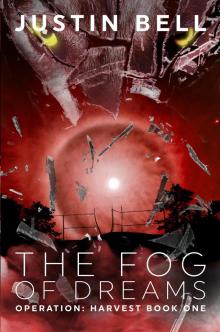 The Fog of Dreams
The Fog of Dreams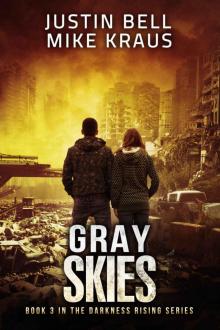 Gray Skies
Gray Skies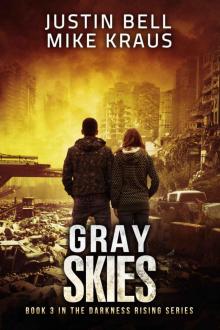 Gray Skies_the Thrilling Post-Apocalyptic Survival Series
Gray Skies_the Thrilling Post-Apocalyptic Survival Series Birth of Rebellion (War of the Three Planets Book 4)
Birth of Rebellion (War of the Three Planets Book 4)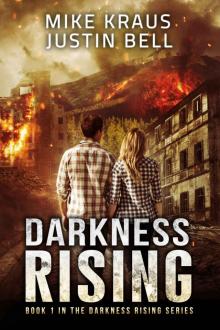 Darkness Rising
Darkness Rising Scorched Earth: Book 2 in the Thrilling Post-Apocalyptic Survival Series: (Zero Hour - Book 2)
Scorched Earth: Book 2 in the Thrilling Post-Apocalyptic Survival Series: (Zero Hour - Book 2)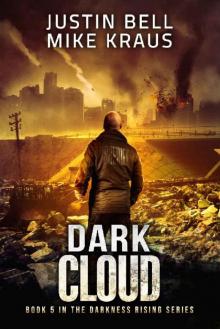 Dark Cloud: Book 5 in the Thrilling Post-Apocalyptic Survival Series: (Darkness Rising - Book 5)
Dark Cloud: Book 5 in the Thrilling Post-Apocalyptic Survival Series: (Darkness Rising - Book 5)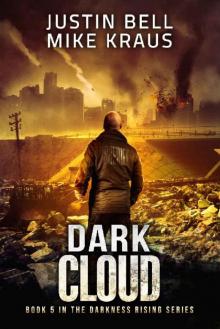 Dark Cloud_Thrilling Post-Apocalyptic Survival Series
Dark Cloud_Thrilling Post-Apocalyptic Survival Series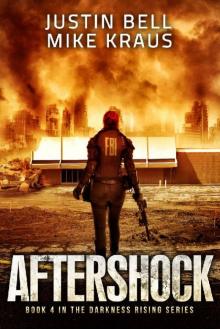 Aftershock: Book 4 in the Thrilling Post-Apocalyptic Survival Series: (Darkness Rising - Book 4)
Aftershock: Book 4 in the Thrilling Post-Apocalyptic Survival Series: (Darkness Rising - Book 4) Aftershock
Aftershock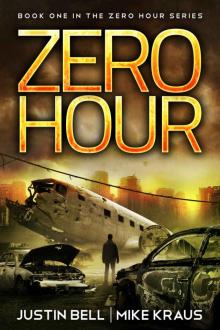 Zero Hour: Book 1 in the Thrilling Post-Apocalyptic Survival Series: (Zero Hour - Book 1)
Zero Hour: Book 1 in the Thrilling Post-Apocalyptic Survival Series: (Zero Hour - Book 1)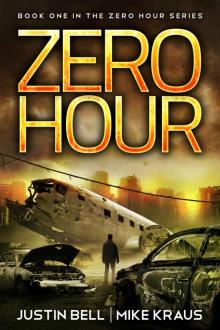 Zero Hour_Thrilling Post-Apocalyptic Survival Series
Zero Hour_Thrilling Post-Apocalyptic Survival Series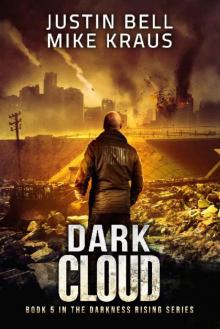 Dark Cloud
Dark Cloud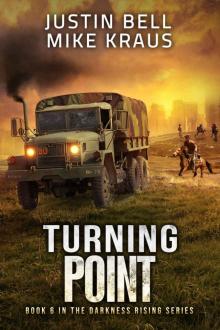 Turning Point: Book 6 in the Thrilling Post-Apocalyptic Survival Series: (Darkness Rising - Book 6)
Turning Point: Book 6 in the Thrilling Post-Apocalyptic Survival Series: (Darkness Rising - Book 6)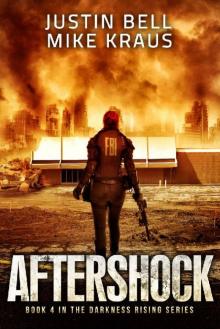 Aftershock_the Thrilling Post-Apocalyptic Survival Series
Aftershock_the Thrilling Post-Apocalyptic Survival Series War of the Three Planets Collection (Book 01)
War of the Three Planets Collection (Book 01) Stars on Fire
Stars on Fire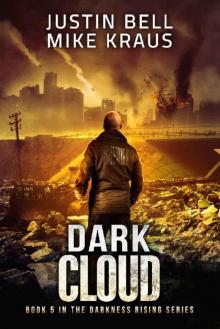 Dark Cloud_the Thrilling Post-Apocalyptic Survival Series
Dark Cloud_the Thrilling Post-Apocalyptic Survival Series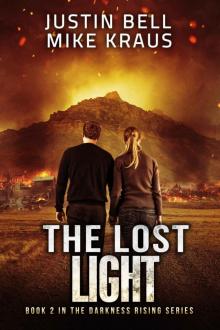 The Lost Light
The Lost Light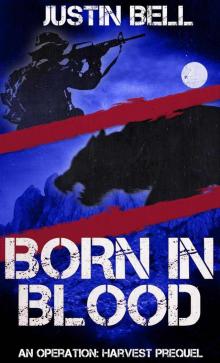 Born in Blood
Born in Blood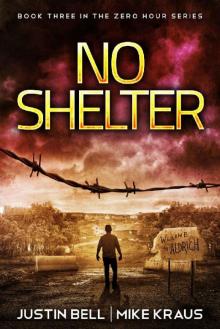 No Shelter: Book 3 in the Thrilling Post-Apocalyptic Survival Series: (Zero Hour - Book 3)
No Shelter: Book 3 in the Thrilling Post-Apocalyptic Survival Series: (Zero Hour - Book 3) Iridium Attacks
Iridium Attacks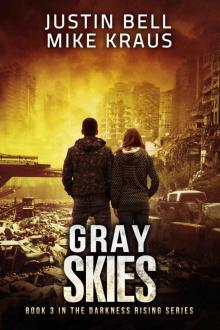 Gray Skies: Book 3 in the Thrilling Post-Apocalyptic Survival Series: (Darkness Rising - Book 3)
Gray Skies: Book 3 in the Thrilling Post-Apocalyptic Survival Series: (Darkness Rising - Book 3) It's Always Darkest
It's Always Darkest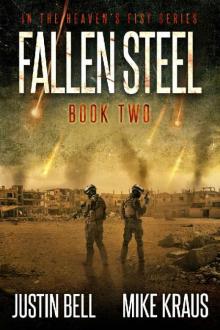 Fallen Steel: Book 2 in the Thrilling Post-Apocalyptic Survival Series: (Heaven's Fist - Book 2)
Fallen Steel: Book 2 in the Thrilling Post-Apocalyptic Survival Series: (Heaven's Fist - Book 2)